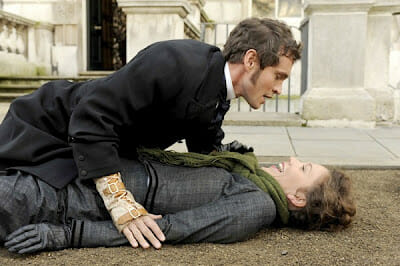Introducing Endless Mode: A New Games & Anime Site from Paste
Walk into any comedy club or check out any sitcom, and at some point, a guy will question a woman’s sanity. Women and men both dismiss it as lighthearted fun, but what if there existed a world where people actually believed that women are just inherently nuts? That world was Earth in the 1800s, and the romantic comedy Hysteria shows how a few of the planet’s inhabitants set out to change it with the help of … the vibrator?
Dr. Mortimer Granville (Hugh Dancy) can’t seem to catch a break. He’s a forward-thinking doctor in 19th century Victorian London. Young, good-looking and believing in such radical ideas as fighting germs by washing your hands, his mind is set more on healing than HMOs and co-pays. However, the good doctor is quickly dismissed by his superior who doles out leaches like Tylenol. Luckily, he can count on his wealthy, promiscuous BFF Edmund St. John-Smythe (Rupert Everett) to cheer him up or endanger his life with his experiments using electricity. (Think Weird Science 100 years before Oingo Boingo).
Granville applies for the booming practice of Dr. Robert Dalrymple (Jonathan Pryce). Women all around town pack the good doctor’s office to deal with hysteria, which he “treats” by giving them orgasms by way of his hand. Granville signs on, all in the name of science and becomes beloved by his patients as well as Robert’s daughter, the chaste Emily (Felicity Jones). He’s also vexed by Emily’s sister Charlotte (Maggie Gyllenhaal), who mocks everything her dad stands for, all the while asking for money to fund her desires to help the poor. Granville is fired when his hand gives out on him. Luckily, Edmund and science offer to give him … a hand, in the way of the world’s first vibrator, a discovery that changes the science of self pleasuring even as it strikes a blow for women’s rights.
You’d expect such a tale to be the fodder of late night cable or worse yet, a porn parody, but director Tanya Wexler manages to pull it off thanks to a solid story and great casting while keeping an undeserved R rating (sorry, guys). Sure, the modern vibrator is the staple of today’s porn, but Wexler stays true to the story with only one set of bare breasts throughout the film. Focusing more on how scientific ingenuity not only overcame a degree of sexism, but also views on sexuality in general, the film manages to take the film from being sexual to nearly educational (complete with a look at vibrators over the years in the end credits). Hysteria as a mental illness was a serious matter dealt with in barbaric ways—the least of which was imprisonment—when much of it simply dealt with a woman being sexually unsatisfied. Wexler wisely opts to integrate this bit of history into the film, although it could be seen as a bit too late for some.
Despite the subject matter, Hysteria is a serviceable period piece through and through. From the costumes to the horse and carriages, you don’t forget that you’re in a different time, with different societal rules. The speech seems authentic enough, and you won’t confuse it with some period piece struggling to be ultra modern. The publicly outspoken Gyllenhaal seems at home as the feminist who isn’t afraid to challenge a male-dominated society or punch a cop in the jaw in the name of equality. Dancy is also commendable as the reserved doctor who has to soften his heart (as is often the case with rom-coms). Rupert Everett steals most scenes that he’s in, and it’s a shame that he hasn’t been seen more on the big screen.
In fact, the only major misstep in the film is the romance between Mortimer and Charlotte. The two have little to no onscreen chemistry at all. Although Charlotte’s passion for her clinic/commune seems sincere—with examples of patients and families in need provided—the interaction between Mortimer and Charlotte is sporadic and forced. For a film dealing with sexuality, it’s a sad irony that these two romantic leads characters have nothing resembling a sexual spark.
Hysteria is a film that will undoubtedly get lost with all the capes and battleships floating around, but it’s also the type of film that you can’t wait to tell your friends about after you’ve seen it on cable. You may not get as much pleasure as some of Granville’s patients, but you’ll get a grownup thrill from watching a well-thought-out film.
Director: Tanya Wexler
Writer: Stephen Dyer, Jonah Lisa Dyer, Howard Gensler
Starring: Hugh Dancy, Maggie Gyllenhaal, Rupert Everett
Release Date: May 18, 2012 (limited)
